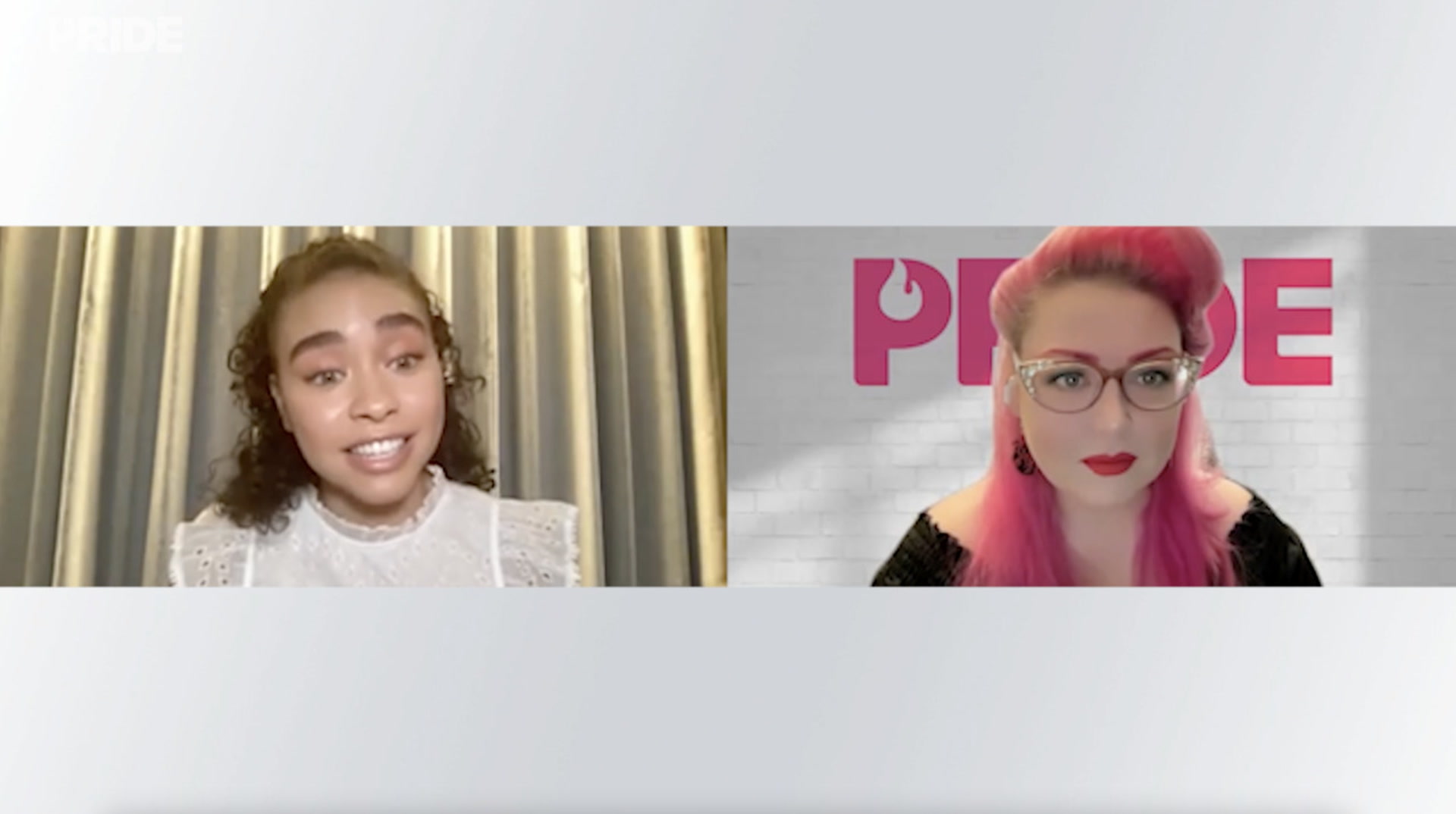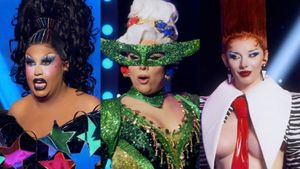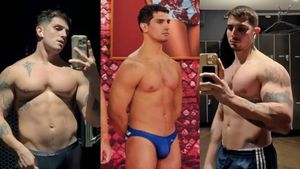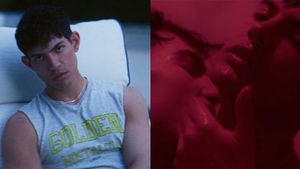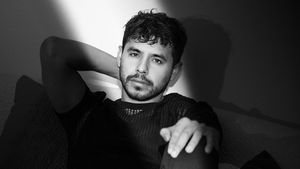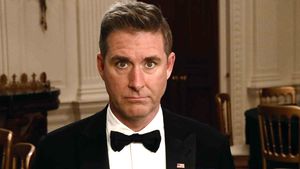This is not the first time Interview With The Vampire has made it to screens. For 1994’s beloved cinematic adaption, Tom Cruise and Brad Pitt starred as Lestat and Louis, respectively, in a film that dripped with subtextual queerness as the two entered into an eternal (if toxic) bond. It danced around that same-sex dynamic, never fully committing to what we all could see: that the two were lovers.
This week, a new Interview has commenced, this time on AMC and starring Sam Reid and Jacob Anderson as the vampire seducer and his sire, respectively. This time, however, the subtext has been staked and in its place is the most unapologetically and gloriously queer series we have had the pleasure of witnessing in a long time. It’s just one of the ways that this new take on Anne Rice’s iconic series has been modernized. The series it also explores racial and class dynamics, and digs into the nuance of Lestat and Louis’ doomed romance in a way that a less openly queer version could never hope to replicate.
 Courtesy of AMC
Courtesy of AMC
The show boasts a lush and immersive setting that sweeps you away to New Orleans in the late 1700s, with all its indulgent revelry and not-so-hidden corruption. It’s a perfect time and place to set a vampire romance, especially one that walks a fine line between camp and biting social commentary.
At its core of the story, however, is the connection between its two leads, who thankfully have both the acting chops and the crackling chemistry to make it all work. For Reid and Anderson, that comes down to how well they click off-camera as well as on.
“We’re very similar in a lot of ways and so that was a big relief,” Reid tells PRIDE. “It’s a very bizarre job to do when you’re doing it because you’re shooting entirely at night. You have sort of amazing costumes and contact lenses and accents and teeth and blood and the scenes,” he recalls, explaining how having that connection is essential when there’s such a technical aspect to bringing the story to life beyond just their performances. “We have special effects come in and blood come in, or we’re on a rig of some kind. It’s a weird experience.” Maintaining their characters and being in the moment comes down to using a kind of unspoken shared language. “To have somebody who’s similar and can process these things the same way as you and bounce off and, and decompress, which I think is vital,” he explains.
 Courtesy of AMC
Courtesy of AMC
Whatever they are doing, it’s working, and what plays out over the course of the first few episodes takes the audience through the initial seduction into something more profound. “As soon as you get through the fact that they’re in a romantic relationship, and that they love each other very deeply, then you get to really look at what the hell this relationship was about, what’s the nuance and the complexities of it? Because it’s not straightforward,” says Reid.
That’s not to say there isn’t plenty of passion in the series. Anderson explains how when they approached filming the love scenes, it was important they communicate more than just desire. “In the first love scene, in the first episode, we did talk a lot about things like, ‘what are the beats? What are the emotional beats?’” he tells PRIDE. “We wanted to have a moment where you see them smile at each other, that it’s not just this like burst of tortured energy turning into something. These two are really attracted to each other. And this is an exciting thing and a promising thing for their relationship. All of the promise that’s there at that moment. And we wanted to make sure that that’s what that scene was about.”
 Courtesy of AMC
Courtesy of AMC
While the steamy scenes may initially seduce viewers, there’s a lot more on display to keep them coming back for more. The quiet and humorous moments, for example, truly lay bare the fullness of the couple’s relationship. That’s true whether it’s a small argument between their adjacent coffins, or sneaking into the other coffin for a little late-night nookie when they think the kid is asleep. “Yeah, it was always my favorite stuff. Yeah, the domesticity of their relationship,” Anderson says.
“It’s so fun to do that stuff as well,” agrees Reid. “They’re so powerful and they could do so many other things. But they just want to have this little human life. Try and make a nest and power through together. It’s very fun to play with the dynamic of these very powerful beings trying to make a home.”
 Courtesy of AMC
Courtesy of AMC
As in the book and the film before it, this version of Interview introduces audiences to the child vampire Claudia, this time played by Bailey Bass. “There’s so much despair and darkness in the story as well and it’s really nice to have those things particularly like from Louis’ point of view,” says Anderson. “So much of what he’s grieving is his family. And that is part of human life. And he really wants to sort of rebuild a version of that with Lestat and with Claudia”
Initially, Claudia has reason to be grateful for the new eternal life bestowed upon her by her surrogate fathers. “She didn’t grow up with much,” Bass tells PRIDE. “She gets changed and she gets to be rich now. She lives in this incredible house, she doesn’t have to walk around barefoot anymore, she gets a plethora of dresses, rather than just wearing the same two every other day. She gets introduced into this new world.”
 Courtesy of AMC
Courtesy of AMC
But while her mind ages and grows up, her body never will, and soon it begins to feel as though it’s not her body anymore. While Claudia’s story isn’t explicitly trans in nature, her dysphoria is something that has metaphorical resonance. “Being stuck in this 14-year-old body...she doesn’t see the person that she was supposed to become, the person that she would have become if she was never turned. And she has this dilemma. It’s like, ‘OK, I wish I died rather than be in this body.’ And that’s really, really dark,” explains Bass. But that’s not the end of her narrative. “She learns to come to peace with it, and gain her power and her worth,” Bass says.
“I was doing these vulnerable scenes where I felt Claudia was weak,” recalls Bass. “[Director Levan Akin] was like, ‘No, she is always powerful, no matter how sad or dramatic or vulnerable. She feels she has that power.’ It’s empowering for other people to see that you can be having a panic attack, but that doesn’t remove your worth. You can lose your job, you can lose everything, but you are still you no matter what. Claudia feels that throughout the entire show. I’m excited for everyone that watches this to know that there’s a place for you in this world and that you are loved no matter what. And that everyone deserves love no matter who you are, no matter where you came from. We spotlight that in this show.”
 Courtesy of AMC
Courtesy of AMC
Ultimately, the series so far succeeds in telling these stories rife with love and desire, but also all-too-human failings. But then that’s why we love vampire tales: the monster is the embodiment of all our darkest desires, but also fears, and that’s what ironically makes them so very human.
Interview With The Vampire is currently airing on AMC. Watch our full interviews with Jacob Anderson, Sam Reid, and Bailey Bass below.
RELATED | 10 Sexy Pics of Interview With the Vampire's Sam Reid & Jacob Anderson









































 Courtesy of AMC
Courtesy of AMC Courtesy of AMC
Courtesy of AMC Courtesy of AMC
Courtesy of AMC Courtesy of AMC
Courtesy of AMC Courtesy of AMC
Courtesy of AMC Courtesy of AMC
Courtesy of AMC